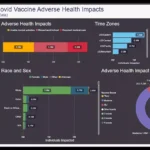A Misleading Measles “Outbreak”
In May 2023, news quickly spread about a supposed measles outbreak in Maine. Headlines from various outlets sparked alarm, warning about the risks and dangers associated with the virus. However, recently obtained CDC documents revealed a surprising twist. The measles case that triggered the scare was vaccine-induced, not the result of a wild virus strain.
CDC Confirms Vaccine Strain
The child at the center of this controversy had tested positive for measles on May 5. Despite the child receiving the measles, mumps, and rubella (MMR) vaccine, the Maine CDC treated the case cautiously, prompting concerns of a larger outbreak.
The CDC later confirmed that the child's measles strain was consistent with the vaccine strain, not the wild virus, which meant the child wasn’t infectious. The confirmation alleviated concerns about a broader measles outbreak stemming from the case and highlighted the importance of understanding vaccine-associated reactions. This finding underscores the critical role of accurate diagnosis and communication to prevent unnecessary panic. Meanwhile, the CDC warning on amoeba infections reminds the public to remain vigilant about other emerging health threats that pose significant risks, particularly in warmer climates.
Unnecessary Delay in Reporting
One key question is why the Maine CDC raised the alarm without waiting for the test results. Even after the child was diagnosed on May 3, sending the sample to the CDC took five days, followed by another week before the CDC confirmed the vaccine strain. During this delay, the public was led to believe a wild measles outbreak was occurring.
The Role of Vaccine-Associated Rash
According to the World Health Organization, around 2% of individuals vaccinated for measles can develop a rash. This vaccine-associated rash, known as VARI (vaccine-associated rash illness), closely resembles the symptoms of measles but is generally not considered infectious. Despite this common occurrence, the Maine CDC did not immediately clarify the situation, leaving the public in the dark.

Concerns Over Public Fear
Critics argue that Maine's response to the measles case aligns with strategies to boost vaccine uptake by creating public anxiety. Documents suggest that the CDC’s approach involves increasing concern about the dangers of diseases to drive the demand for vaccines.
Statements from public health experts and visible examples of illnesses are tools often used to reinforce the perceived need for vaccination, as was seen in this case.
While measles remains a serious disease, the Maine measles case highlights how public health messaging can sometimes fuel unnecessary fear.
The CDC's confirmation that the child's case was vaccine-related and non-infectious underscores the importance of clear, timely communication from health authorities to avoid misinformation and undue alarm.

Carl Riedel is an experienced writer and Open Source Intelligence (OSINT) specialist, known for insightful articles that illuminate underreported issues. Passionate about free speech, he expertly transforms public data into compelling narratives, influencing public discourse.













